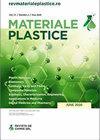酚醛树脂涂层厚度对金属材料机械性能和耐腐蚀性的影响
IF 0.7
4区 材料科学
Q4 MATERIALS SCIENCE, MULTIDISCIPLINARY
引用次数: 0
摘要
在石化和其他工业领域,金属材料面临着冲击和高温电化学腐蚀等威胁。因此,既能有效减弱冲击力,又能阻挡腐蚀介质的有机涂层备受关注。热固性酚醛树脂 2130 以其简便的固化过程、优异的热稳定性、耐水性、耐腐蚀性和固化后的优异机械性能而著称,在涂料领域有着广泛的应用。为了解决在复杂工件上沉积完整均匀的树脂涂层这一难题,我们通过旋转蒸发结合长期低温干燥的方法在 304 不锈钢表面沉积了不同厚度的涂层。通过机械测试、电化学分析和长期使用失重评估等综合方法,研究和分析了涂层厚度与机械性能和耐腐蚀性之间的关系。结果表明,沉积在金属表面的涂层具有良好的完整性和致密性。此外,涂层厚度的增加会显著降低材料的腐蚀率。涂层具有极佳的基体附着力和柔韧性,因此能有效防止金属基体受到冲击。涂层厚度与表面粗糙度之间的关系非常明显,而涂层的柔韧性则随着涂层厚度的增加而先增大后减小。当涂层厚度为 7 μm 时,涂层的最大表面粗糙度为 0.44 μm。在这些条件下,涂层的冲击韧性达到峰值,呈现出韧性断裂模式,显示出卓越的综合机械性能。本研究的结果将为后续工业生产中树脂涂层的研究和配方提供理论支持。本文章由计算机程序翻译,如有差异,请以英文原文为准。
Effect of Phenolic Resin Coating Thickness on Mechanical Properties and Corrosion Resistance of Metal Materials
In the realm of petrochemical and other industries, metal materials face threats such as impact and high-temperature electrochemical corrosion. Consequently, there has been significant attention towards organic coatings that effectively attenuate impact forces while simultaneously providing a barrier against corrosive agents. The thermosetting phenolic resin 2130, known for the facile curing process, exceptional thermal stability, water resistance, corrosion resistance, and superior mechanical properties post-curing, finds extensive applications in the field of coatings. To address the challenge of depositing a complete and uniform resin coating on complex workpieces, coatings with varying thicknesses on the surface of 304 stainless steel were deposited via rotary evaporation combined with long-term low-temperature drying. The relationship between coating thickness and mechanical properties, as well as corrosion resistance, was investigated and analyzed through a comprehensive approach involving mechanical testing, electrochemical analysis, and long-term service weight loss assessment. The results demonstrated that the coatings deposited on the metal surface exhibited excellent integrity and compactness. Moreover, an increase in coating thickness led to a significant reduction in material corrosion rate. The coatings exhibited excellent substrate adhesion and flexibility, thereby providing effective protection against impact on the metal substrate. The relationship between the thickness of the coating and the surface roughness was evident, while the flexibility of the coating first increased and then decreased with the increase of coating thickness. When the coating thickness was 7 μm, the maximum surface roughness of the coating measured 0.44 μm. Under these conditions, the impact toughness of the coating reached the peak, exhibiting a ductile fracture mode and showcasing superior comprehensive mechanical properties. The findings of this study will offer theoretical support for the investigation and formulation of resin coatings in subsequent industrial production.
求助全文
通过发布文献求助,成功后即可免费获取论文全文。
去求助
来源期刊

Materiale Plastice
MATERIALS SCIENCE, MULTIDISCIPLINARY-
CiteScore
1.40
自引率
25.00%
发文量
99
审稿时长
6-12 weeks
期刊介绍:
Materiale Plastice, abbreviated as Mater. Plast., publishes original scientific papers or guest reviews on topics of great interest.
The Journal does not publish memos, technical reports or non-original papers (that are a compiling of literature data) or papers that have been already published in other national or foreign Journal.
 求助内容:
求助内容: 应助结果提醒方式:
应助结果提醒方式:


